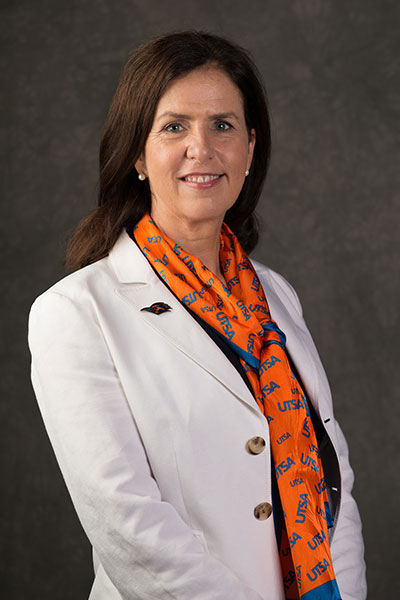Bexar County Foster Youths Pursue College Success
In fiscal 2019, Bexar County had more children in foster care than any other Texas county: 11 percent of the state’s 33,329 foster children. Pursuing higher education – and life beyond – often poses challenges for which these youths are unprepared. But now several local institutions have joined forces with the goal of mitigating these challenges by creating a program tailored to this population.

Peggy Eighmy
With $3.5 million in legislative appropriations, the University of Texas at San Antonio (UTSA), Texas A&M University-San Antonio and Alamo Colleges District developed the Bexar County Fostering Educational Success Pilot Program.
The pilot program builds on state initiatives already in place, such as the state college tuition waiver and the supervised independent living program, by improving college readiness and supporting college attendance among students with a history of foster care in Bexar County.
The pilot program has partnered with the Bexar County Children’s Court – through what’s called the “College Bound Docket” – to improve college readiness for youths still in care using specialty court review hearings that focus on their educational interests and goals. For students already enrolled in college, the pilot program has established Fostering Educational Success Centers – physical spaces on campus with full-time staff that offer myriad resources to foster care alumni, including academic support services and emergency funds.
Peggy Eighmy, wife of UTSA President Taylor Eighmy, is a leader and major proponent of the pilot program. She said the pilot program is unique thanks to its support from engaged, financially committed partners in county government, the judiciary, the nonprofit sector and higher education.
Line Items recently spoke with Peggy Eighmy about the pilot program and its impact.
Line Items: Why is it important to implement localized programs, such as the Bexar County Fostering Educational Success Pilot Program, in conjunction with state programs already in place?
Eighmy: The Texas tuition and fee waiver is a wonderful benefit, and I applaud the Texas Legislature for its early adoption and its expansive nature. But if young people leave foster care without being college aware and college ready, and then don't have targeted support once they enroll in college, we are never going to increase the number of young people with a history of foster care who graduate from college and go on to successful careers and lives as contributing members of society.
The Bexar County Fostering Educational Success Pilot Program is a truly novel approach. The pilot will increase access, retention and graduation rates for students with a history of foster care and, equally important, will increase the number of children still in foster care who are college aware and emotionally and academically prepared for college.
LI: What was the inspiration for this program?
Eighmy: I have worked in the child welfare system in Massachusetts, Tennessee and Texas, and I have been a Court Appointed Special Advocate (CASA) for many years. I know first-hand the negative impact foster care can have on children.
When my husband accepted the job as UTSA’s president, I knew for certain that I wanted to impact real change in the lives of young people with a history of foster care in Bexar County, and the role as UTSA’s first lady has given me a unique platform for doing so.
LI: Can you share a story about how this program has made a difference for a particular student?
Eighmy: Israel B. is a senior at UTSA who majors in kinesiology. He does not have a biological or adoptive family to fall back on or celebrate milestones with. Before we launched the program at UTSA, he felt unsupported and alone, and it was taking him longer to graduate than he wanted or expected. He shared freely the many negative experiences he had at UTSA prior to the launch of the pilot, and his input helped to shape our program. Prior to COVID, he visited the Fostering Educational Success Center regularly and has described it as the welcoming and safe place he was looking for. Program staff help him to navigate life at UTSA, and he has relied on emergency funds to assist with things like internet access and food insecurity and, equally importantly, has found a community of students with a shared experience.
LI: How is this program beneficial for foster youth during the COVID-19 health crisis?
Eighmy: The pilot program has seen a significant increase in the engagement of students and the provision of resources and support, particularly related to utilization of emergency funds. These funds have been critical to supporting the safety and well-being of our students. Our most common uses of the emergency fund have been related to basic needs of loss of income, food, housing, utilities, internet access, technology and medical bills. We increased the per-student emergency allotment from $300 to $500 and raised additional private philanthropic dollars to ensure that we can continue to meet our students’ needs.
LI: In your opinion, what changes in state and local policies are necessary for the continued success of foster youth?
Eighmy: Our local and state government must continue to invest in evidence-based programs like ours that provide young people with a history of foster care the truly comprehensive support they need to enroll in and graduate from college. Further, if we really want to make certain that more children who have been in foster care graduate from a two- or four-year college, we cannot wait until they get to our college campuses. We must continue to invest in innovative programs that not only help kids still in foster care believe they can go to college, but also give them the concrete support and skills they need to do so.
Learn how the state of Texas has implemented programs over the years to increase college access, retention and graduation rates among foster care alumni statewide in the April 2020 issue of Fiscal Notes. FN

